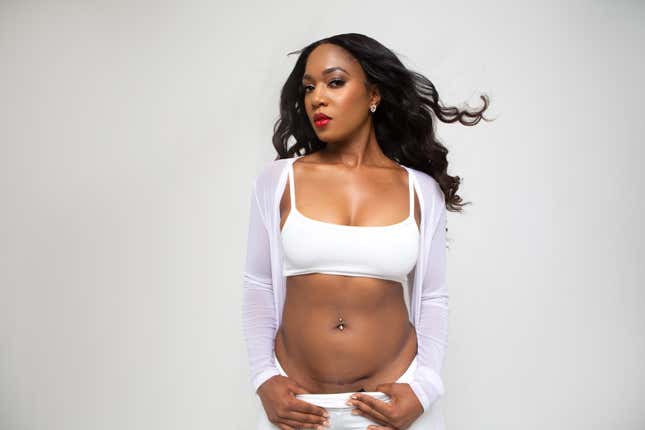
Dawn Heels is a lawyer by day. But the 39-year-old U.K. resident also creates online content around women’s health, finance and property on her Instagram and YouTube platforms. And she is currently on a mission to raise awareness about fibroids, noncancerous tumors in and around the uterus that impact 80 percent of Black women by age 50. We spoke exclusively with Dawn about her journey with fibroids and how she’s using her personal story to help others.
In 2016, Heels found herself in a work environment filled with stress. She began experiencing pain in her abdomen, and decided to go to her primary care doctor. “He said he thought it was linked to my [menstrual] cycle and sent me on my way,” she said. Over the next few weeks, the pain got worse. Heels was convinced that something was wrong. “I went back to the doctor who just told me to take a [painkiller].” But Heels wasn’t satisfied with that advice, and decided to get another opinion.
She went to the hospital for an ultrasound, where doctors discovered the fibroids. “They told me I had two fibroids and said I should make an appointment with my doctor,” she said. The doctor advised her to use painkillers and a hot water bottle to manage the pain. But between 2016 and 2020, the symptoms got worse. “I was experiencing worse pain. I was bloated. My periods were heavy, and I was nauseous,” she said. Frustrated, Heels told her primary care doctor that she wanted to see a gynecologist. A pelvic exam confirmed the two fibroids. But they had grown in size from four centimeters to six. “He suggested sending me to a fertility expert. But I didn’t think that was really dealing with the problem,” she said.
By 2021, the pain was unbearable, and Heels went back to the gynecologist. But a year after her original diagnosis, she now had six fibroids. One was the size of a grapefruit. “This is why I was having all of the symptoms, and I couldn’t get pregnant,” she said. The doctor said Heels would have to have an open myomectomy, a medical procedure to remove fibroids from the uterine wall by making an incision through the skin on the lower abdomen. “I had the operation in January 2022. [The doctor] came in the next day and showed me a picture of what he took out. There were 16. It was like the solar system,” she said.

Today, six months since her surgery, Heels says everything is fine. “Since the operation, my periods have been a breeze. And now I realize that this is how it’s supposed to be,” she said. Throughout her healing process, she shared her deeply personal journey along with live conversations with other fibroid warriors and experts with her Instagram followers. Heels says she’s connected with lots of people who have faced similar experiences. But she says women in the U.S. have been especially supportive. “My U.S. sisters were fantastic. I think it is a cultural thing. We Brits are very reserved. But Americans love to talk things out, and we applaud you for that,” she said.
Through her advocacy, Heels wants to normalize the conversation about fibroids and empower women to advocate for themselves. “Push for that second, third or fourth opinion,” she said. “If it’s impacting your health, something should be done about it,” she said. “Severe period pain is not normal. So it means something is going on down there.”

